- Home
- Gillian Flynn
The Complete Gillian Flynn Page 50
The Complete Gillian Flynn Read online
Page 50
The group was all looking at me now, curious, a little concerned, like I was some pet bunny they just realized might be rabid.
“Libby,” Lyle said in the soothing tones of a talk-show host. “No one doubts you were in the house. No one doubts you survived an incredibly horrific ordeal no child should ever endure. But did you really see with your own eyes what you say you saw? Or may you have been coached?”
I was picturing Debby, sifting my hair with nimble, pudgy fingers, braiding it in the fishbone style she insisted was more difficult than French braids, huffing warm baloney breath on the back of my neck. Tying a green ribbon on the end, turning me into a present. Helping me balance on the edge of the bathtub so I could hold a handmirror and see the back of my furrowed head in the looking glass over the sink. Debby, who so desperately wanted everything to be pretty.
“There’s no proof that anyone but Ben killed my family,” I said, pulling back to the land of the living, where I live by myself. “He never even filed an appeal, for Christsakes. He’s never tried to get out.” I had no experience with convicts, but it seemed to me that they were always launching appeals, that it was a passion for them, even if they had no shot. When I pictured prison, I pictured orange jumpsuits and yellow legal pads. Ben had proved himself guilty by sheer inertia—my testimony was beside the point.
“He had reason enough for eight appeals,” Magda pronounced, grandly. I realized she was one of those women who would show up on my doorstep to scream at me. I was glad I’d never given Lyle my address. “Not fighting doesn’t mean he’s guilty, Libby, it means he’s lost hope.”
“Well, then good.”
Lyle widened his eyes.
“Oh, God. You really think Ben did it.” Then he laughed. Once, accidentally, quickly swallowed but entirely genuine. “Excuse me,” he murmured.
No one laughs at me. Everything I say or do is taken very, very seriously. No one mocks a victim. I am not a figure of mirth. “Well, you all enjoy your conspiracy theories,” I said, and bumped up from the chair.
“Oh don’t be like that,” said the cop-guy. “Stay. Convince us.”
“He never … filed … an appeal,” I said, like a preschool teacher. “That’s good enough for me.”
“Then you’re an idiot.”
I flipped him off, a hard gesture like I was digging into cold earth. Then I turned away, someone behind me saying, “She’s still a little liar.”
I darted back into the crowd, pushing my way under armpits and past groins until I arrived back into the cool of the stairwell, the noise behind me. My only victory of the night was the wad of money in my pocket and the knowledge that these people were as pathetic as I was.
I GOT HOME, turned every light on, and got into bed with a bottle of sticky rum. I lay sideways, studying the intricate folds of Michelle’s note, which I’d forgotten to sell.
THE NIGHT FELT tilted. Like the world had once been carefully parceled out between people who believed Ben guilty and people who believed him innocent, and now, those twelve strangers crunched in a booth in a downtown basement had scrambled over to the side of the innocent with bricks in their pockets, and—boom!—that’s where all the weight was now. Magda and Ben and poetry and a force of hope. Footprints and bloodstains and Runner going berserk. For the first time since Ben’s trial, I had fully subjected myself to people who believed I was wrong about Ben, and it turns out I wasn’t entirely up to the challenge. Me of little faith. On another night, I might have shrugged it all off, like I usually did. But those people were so assured, so dismissive, as if they’d discussed me countless times and decided I wasn’t worth grilling that hard. I’d gone there assuming they’d be like people used to be: they might want to help me, take care of me, fix my problems. Instead they mocked me. Was I really that easy to unsettle, that flimsy?
No. I saw what I saw that night, I thought, my forever-mantra. Even though that wasn’t true. The truth was I didn’t see anything. OK? Fine. I technically saw nothing. I only heard. I only heard because I was hiding in a closet while my family died because I was a worthless little coward.
THAT NIGHT, THAT night, that night. I’d woken up in the dark in the room I shared with my sisters, the house so cold that frost was on the inside of the window. Debby had gotten in bed with me at some point—we usually jammed in together for warmth—and her plump behind was pushed into my stomach, pressing me against the chilled wall. I’d been a sleepwalker since I could toddle, so I don’t remember pulling myself over Debby, but I do remember seeing Michelle asleep on the floor, her diary in her arms as usual, sucking on a pen in her sleep, the black ink drooling down her chin with her saliva. I hadn’t bothered trying to wake her up, get her back in bed. Sleep was viciously defended in our loud, cold, crowded house, and not one of us woke without a fight. I left Debby in my bed and opened the door to hear voices down the hall in Ben’s room—urgent whispers that bordered on noise. The sounds of people who think they’re being quiet. A light coming from the crack under Ben’s door. I decided to go to my mom’s room, padded down the hall, pulled back her covers and pressed myself against my mother’s back. In the winter, my mom slept in two pairs of sweats and several sweaters—she always felt like a giant stuffed animal. She usually didn’t move when we got in bed with her, but that night I remember she turned to me so quickly I thought she was angry. Instead she grabbed me and squeezed me, kissed my forehead. Told me she loved me. She hardly ever told us she loved us. That’s why I remember it, or think I do, unless I added that for comfort after the fact. But we’ll say she told me she loved me, and that I fell immediately back to sleep.
When I next woke, it could have been minutes or hours later, she was gone. Outside the closed door, where I couldn’t see, my mother was wailing and Ben was bellowing at her. There were other voices too; Debby was sobbing, screaming Mommymommymommymichelle and then there was the sound of an axe. I knew even then what it was. Metal on air—that was the sound—and after the sound of the swing came the sound of a soft thunk and a gurgle and Debby made a grunt and a sound like sucking for air. Ben screaming at my mom: “Why’d you make me do this?” And no sound from Michelle, which was strange, since Michelle was always the loudest, but nothing from her. Mom screaming Run! Run! Don’t Don’t. And a shotgun blast and my mom still yelling but no longer able to make words, just a screeching sound like a bird banging into the walls at the end of the hallway.
Heavy foot treads of boots and Debby’s small feet running away, not dead yet, running toward my mom’s room and me thinking no, no, don’t come here and then boots shaking the hallway behind her and dragging and scratching at the floor and more gurgling, gurgling, banging and then a thud and the axe sound and my mom still making horrible cawing sounds, and me standing, frozen, in my mom’s bedroom, just listening and the shotgun blasting my ears again and a thunk that rattled the floorboards beneath my feet. Me, coward, hoping everything would go away. Huddling half in and out of the closet, rocking myself. Go away go away go away. Doors banging and more footsteps and a wail, Ben whispering to himself, frantic. And then crying, a deep male crying and Ben’s voice, I know it was Ben’s voice, screaming Libby! Libby!
I opened a window in my mom’s room and pushed myself through the broken screen, a breech birth onto the snowy ground just a few feet below, my socks immediately soaked, hair tangling in the bushes. I ran.
Libby! Looking back at the house, just a single light in a window, everything else black.
My feet were raw by the time I reached the pond and crouched in the reeds. I was wearing double layers like my mom, longjohns under my nightgown, but I was shaking, the wind ruffling the dress and blasting cold air straight up to my belly.
A flashlight frenetically scanned the tops of the reeds, then a copse of trees not far away, then the ground not far from me. Libby! Ben’s voice again. Hunting me. Stay where you are, sweetheart! Stay where you are! The flashlight getting closer and closer, those boots crunching on the snow and me weeping hard into
my sleeve, racking myself until I was almost ready to stand up and get it over with, and then the flashlight just swung back around and the footsteps marched away from me and I was there by myself, left to freeze to death in the dark. The light in the house went out and I stayed where I was.
Hours later, when I was too numb to stand upright, I crawled in the weak dawn light back to the house, my feet like ringing iron, my hands frozen in crow’s fists. The door was wide open, and I limped inside. On the floor outside the kitchen was a sad little pile of vomit, peas and carrots. Everything else was red—sprays on the walls, puddles in the carpet, a bloody axe left upright on the arm of the sofa. I found my mom lying on the floor in front of her daughters’ room, the top of her head shot off in a triangular slice, axe gashes through her bulky sleeping clothes, one breast exposed. Above her, long strings of red hair were stuck to the walls with blood and brain matter. Debby lay just past her, her eyes wide open and a bloody streak down her cheek. Her arm was nearly cut off; she’d been chopped through the stomach with the axe, her belly lay open, slack like the mouth of a sleeper. I called for Michelle, but I knew she was dead. I tiptoed into our bedroom and found her curled up on her bed with her dolls, her throat black with bruises, one slipper still on, one eye open.
The walls were painted in blood: pentagrams and nasty words. Cunts. Satan. Everything was broken, ripped, destroyed. Jars of food had been smashed against the walls, cereal sprayed around the floor. A single Rice Krispie would be found in my mother’s chest wound, the mayhem was so haphazard. One of Michelle’s shoes dangled by its laces from the cheap ceiling fan.
I hobbled over to the kitchen phone, pulled it down to the floor, dialed my aunt Diane’s number, the only one I knew by heart, and when Diane answered I screamed They’re all dead! in a voice that hurt my own ears for its keening. Then I jammed myself into the crevice between the refrigerator and the oven and waited for Diane.
At the hospital, they sedated me and removed three frostbitten toes and half of a ring finger. Since then I’ve been waiting to die.
I SAT UPRIGHT in the yellow electricity. Pulled myself out of our murder house and back to my grown-up bedroom. I wasn’t going to die for years, I was hunting-dog healthy, so I needed a plan. My scheming Day brain thankfully, blessedly returned to thoughts of my own welfare. Little Libby Day just discovered her angle. Call it survival instinct, or call it what it was: greed.
Those “Day enthusiasts,” those “solvers” would pay for more than just old letters. Hadn’t they asked me where Runner was, and which of Ben’s friends I might still know? They’d pay for information that only I could get. Those jokers who memorized the floor plans to my house, who packed folders full of crime-scene photos, all had their own theories about who killed the Days. Being freaks, they’d have a tough time getting anyone to talk to them. Being me, I could do that for them. The police would humor poor little me, a lot of the suspects even. I could talk to my dad, if that’s what they really wanted, and if I could find him.
Not that it would necessarily lead to anything. At home under my bright hamster-y lights, safe again, I reminded myself that Ben was guilty (had to be had to be), mainly because I couldn’t handle any other possibility. Not if I was going to function, and for the first time in twenty-four years, I needed to function. I started doing the math in my head: $500, say, to talk to the cops; $400 to talk to some of Ben’s friends; $1,000 to track down Runner; $2,000 to talk to Runner. I’m sure the fans had a whole list of people I could cajole into giving Orphan Day some of their time. I could drag this out for months.
I fell asleep, the rum bottle still in my hand, reassuring myself: Ben Day is a killer.
Ben Day
JANUARY 2, 1985
9:13 A.M.
Ben was free-spinning over ice, the wheels of his bike shimmying. The path was for dirtbikes, for summer, and it had iced over, so it was stupid to ride it. It was more stupid what he was doing: pedaling as fast as he could over the bumpy ground, broken corn stalks on both sides like stubble, and him picking at the goddam butterfly sticker one of his sisters had pasted to the speedometer. It’d been there for weeks, buzzing in and out of his vision, pissing him off, but not enough to deal with it. He bet it was Debby who put it there, loll-eyed and mindless: This looks pretty! Ben had the sparkly thing halfway off when he hit a patch of dirt, his front wheel turning completely to the left, his rear bucking out from under him. He didn’t fly clear. He jerked up, one leg still caught on the bike, and fell sideways, his right arm scraping the corn shards, his right leg bending beneath him. His head smashed the dirt hard, his teeth sang like a bell.
By the time he could breathe again—ten tear-blink seconds—he could feel a warm trickle of blood snake down past his eye. Good. He smeared it with his fingertips down across the side of his cheek, felt a new line of blood immediately stream out of the crack in his forehead. He wished he’d hit harder. He’d never broken a bone, a fact he admitted only when pressed. Really, dude? How do you get through life without breaking something? Your mom wrap you in bubble wrap? Last spring, he’d broken into the town pool with some guys, and stood on the diving board over the big dry hole, staring at the concrete bottom, willing himself to flip in, really smash himself up, be the crazy kid. He’d bounced a few times, taken another swig of whiskey, jiggled up and down some more, and walked back to the guys, who he hardly knew, who’d been watching him only out the sides of their eyes.
A broken bone would be best, but some blood wasn’t bad. It was flowing steadily now, down his cheek, under his chin, dripping on the ice. Pure, round red ponds.
Annihilation.
The word came from nowhere—his brain was sticky, phrases and snatches of songs were always wedging themselves in there. Annihilation. He saw flashes of Norse barbarians swinging axes. He wondered for a second, only a second, if he’d been reincarnated, and this was some leftover memory, flittering down like ash. Then he picked up his bike and banished the idea. He wasn’t ten.
He started pedaling, his right hip knotted, his arm sizzling with the scrape from the corn. Maybe he’d get a good bruise too. Diondra would like that, she’d brush one soft fingertip over it, circle it once or twice and give it a poke so she could tease him when he jumped. She was a girl who liked big reactions, Diondra—she was a screamer, a weeper, a howler when she laughed. She made her eyes go wide, her brows almost up to her hairline when she wanted to seem surprised. She liked to jump out from behind doors and scare him so he’d pretend to chase her. Diondra, his girl with the name that made him think of princesses or strippers, he wasn’t sure which. She was a little of both: rich but sleazy.
Something had rattled loose on his bike, there was a sound like a nail in a tin can coming from somewhere near his pedals. He stopped a second to look, his hands pink and wrinkled in the cold like an old man’s, and just as weak, but could see nothing wrong. More blood pooled into his eyes as he willed himself to find the problem. Fuck, he was useless. He’d been too young when his dad left. He never had a chance to learn anything practical. He saw guys working on motor-cycles and tractors and cars, the insides of the engines looking like the metal intestines of an animal he’d never seen before. Now animals he did know, and guns. He was a hunter like everyone else in his family, but that didn’t stand for much since his mom was a better shot than he was.
He wanted to be a useful man, but he wasn’t sure how to make that happen, and it scared him shitless. His dad had come back to live on the farm for a few months this summer, and Ben had been hopeful, figuring the guy would teach him something after all this time, bother to be a father. Instead, Runner just did all the mechanical stuff himself, didn’t even invite Ben to watch. Made it clear, in fact, that Ben should stay out of his way. He could tell Runner thought he was a pussy: whenever his mom talked about needing to fix something, Runner would say, “that’s men’s work,” and shoot a smile at Ben, daring Ben to agree. He couldn’t ask Runner to show him shit.
Also, he had no money. Corre
ction, he had $4.30 in his pocket, but that was it for him, for this week. His family had no money saved. They had a bank account that was always just short of empty—he’d seen a statement once where the balance was literally $1.10, so at one point his entire family had less in the bank than what he was carrying in his coat right now. His mom couldn’t run the farm right—somehow she was screwing it up. She’d take a load of wheat over to the elevator in a borrowed truck and get nothing—less than what it cost to grow it—and whatever money she did get, she owed. The wolves are at the door, his mom always said, and when he was younger, he pictured her leaning out the back door, throwing crisp green cash at a pack of hounds, them snapping it up like it was meat. It was never enough.
Was anyone going to take the farm away at some point? Shouldn’t someone? The best thing might be to get rid of the farm, start all over fresh, not tied to this big, dead, living thing. But it was his mom’s parents’ place, and she was sentimental. It was pretty selfish, when you thought about it. Ben worked all week on the farm, and then went back to the school on weekends to work his crap janitor’s job. (School and farm and farm and school, that’s all his life was before Diondra. Now he had a nice triangle of places to go: school and farm and Diondra’s big house on the edge of town.) He fed cattle and hauled manure at home, and pretty much did the same at school, cleaning locker rooms and mopping the cafeteria, wiping up other kids’ shit. And still he was expected to turn over half his paycheck to his mom. Families share. Yeah? Well, parents take care of their children, how about that one? How about not squirting out three more kids when you could barely afford the first one?
The bike clattered along, Ben waiting for the whole thing to go to pieces like some comedy routine, some cartoon where he ended up peddling on just a seat and a wheel. He hated that he had to bike places like Opie going to the fishing hole. He hated that he couldn’t drive. Nothing sadder than a boy just short of sixteen, Trey would say, shaking his head and blowing smoke toward him. He said this every time Ben showed up to Diondra’s on his bike. Trey was mostly cool, but he was the kind of guy who always had to get a jab in at another guy. Trey was nineteen, with long hair, black and dull like week-old tar, Diondra’s step-cousin or something weird like that, great-uncle or family friend or stepson of a family friend. He either changed his story a few times, or Ben wasn’t paying close enough attention. Which was entirely possible, since whenever he was around Trey, Ben immediately tensed up, got way conscious of his body. Why was he standing with his legs at that angle? What should he do with his hands? On his waist or in his pockets?

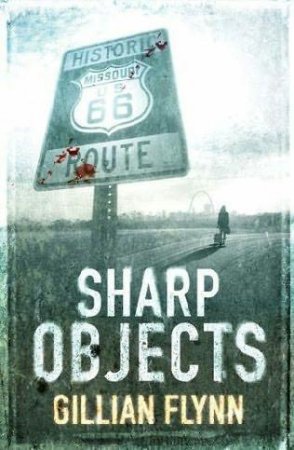 Sharp Objects
Sharp Objects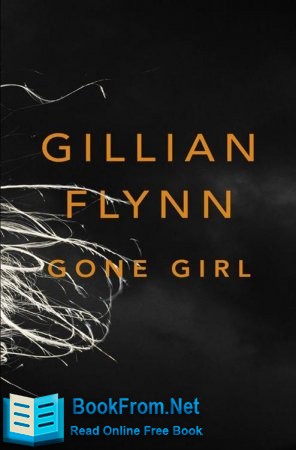 Gone Girl
Gone Girl Dark Places
Dark Places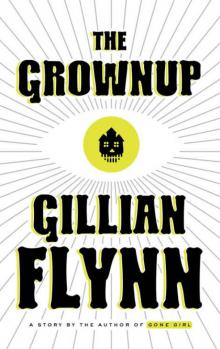 The Grownup
The Grownup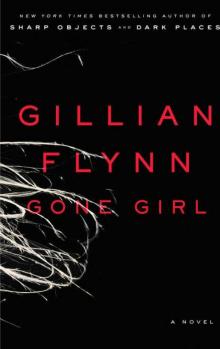 Gone Girl: A Novel
Gone Girl: A Novel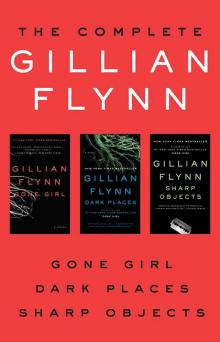 The Complete Gillian Flynn
The Complete Gillian Flynn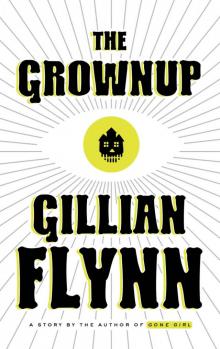 The Grownup: A Story by the Author of Gone Girl (Kindle Single)
The Grownup: A Story by the Author of Gone Girl (Kindle Single)